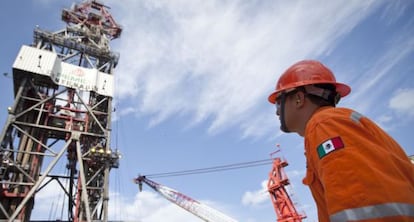Mexico ends 76-year-old state oil and gas monopoly
Opposition PRD threatens to use legal tools to force government to backtrack on reform


The Mexican Senate has taken a historic step by approving the government’s energy reform. The decision, made possible with support from the ruling Institutional Revolutionary Party (PRI) and the conservative National Action Party (PAN), will allow private and foreign investment into a 76-year-old state monopoly.
The step also marks the conclusion of a raft of structural reforms undertaken by President Enrique Peña Nieto to modernize the country. Besides hydrocarbons, considered Mexico’s national treasure, the overhaul has also changed the rules of the game for telecommunications, education, taxes, finance and the voting system.
World attention has been focused on this whirlwind of reforms that resulted from the Pact for Mexico, a cross-party agreement between the PRI, the PAN and the Party of the Democratic Revolution (PRD), although the latter walked away a few months ago in disagreement over the breaking of the oil monopoly.
“With time, when these reforms reach full maturity, their benefits will be felt,” said Peña Nieto on Monday. “We have pushed through an agenda of very important change at the institutional and legislative levels, with participation from all political forces and with a desire to seek the broadest consensus and majority support.”
With time, when these reforms reach full maturity, their benefits will be felt” Mexican President Enrique Peña Nieto
Following the green light from the Senate, the energy reform will move back to Congress for a second reading, and the PRI and the PAN will again exercise their joint majority to ensure the bill becomes law. Although the procedure is considered routine, the PRD has already threatened to organize protests and use all legal resources available to call a referendum to cancel the bill. This party has been a vocal opponent of energy reform, claiming Peña Nieto is selling the country out to foreign interests.
By opening up to private investment, Mexico undoes the historic decision announced on March 18, 1938 by then-president Lázaro Cárdenas to expropriate the country’s oil companies, which up until then had been in the hands of British and US multinationals.
The charismatic revolutionary general took the step after the corporations refused to improve the dismal working conditions of Mexico’s oil workers. His decision brought Mexican society together like nothing else before, triggering a wave of patriotic sentiment that resurfaces every time there is talk about hydrocarbons.
The PRD claims that by turning oil and electricity over to private hands, the nation will lose income to cover its needs in education, health, security, employment and economic growth. Pemex will be overtaken by international competition, will disappear in the mid-term, and the country’s energy dependence will grow, so the argument goes.
The outside world has been enthusiastically supportive of all the reforms
But Peña Nieto is using figures to counter this theory. Pemex is a behemoth employing 150,000 workers that lost $9.3 billion in 2013, but is ready to compete in an increasingly technical market. In the last 13 years, investment in the company has tripled, even as oil production dropped by a third. As a result, Mexico, the world’s seventh-largest energy producer, needs to import 30 percent of the gas and 49 percent of the gas it consumes.
The reform will try to overcome this dysfunctional situation by turning Pemex and its electricity counterpart into what are known as productive companies, which have more powers of self-rule but are also held accountable for results. Pemex will also see its tax burden drop from 79 percent to less than 65 percent – a huge change considering that Pemex’s payments represented a third of the national budget.
Even so, many economists warn that the reform will not dismantle the heavy, paternalistic structure at Pemex, which has one of the lowest productivity rates of all international oil companies.
Under the new system, the oil reserves will remain in state hands, but concessions will be awarded in varying degrees to private companies. The architects of the reform trust this will attract foreign capital with enough capacity to exploit the vast shale gas pockets in the north of the country and to explore the deep reserves, something that requires the kind of technology and money that Pemex lacks.
Economists warn that the reform will not dismantle Pemex’s heavy, paternalistic structure
The government estimates that by 2018 the changes will have created 500,000 new jobs, increased oil production by 20 percent, gas production by 40 percent, and pushed GDP growth up one point.
Average economic growth in Mexico has been 2.4 percent in the last 30 years, but the Pact for Mexico has set a target of 5.0 percent, which authorities figure should be enough to address the country’s major problems of poverty and inequality.
The outside world has been enthusiastically supportive of all the reforms. Sources at the International Monetary Fund (IMF), the World Bank and ratings agency Moody’s have had nothing bad to say about them. One of the first effects has been the breakup of business tycoon Carlos Slim’s telephone empire, a fact that has been viewed abroad as a political victory for Peña Nieto.
Yet inside Mexico, changes are being greeted coldly. The consumer confidence index is at one of its lowest levels. Tax reform will hurt the middle classes, who have been the main supporters of change. Surveys show dwindling support for the reform program, leading the presidency to launch a strong reactivation plan based on an overhaul of the country’s infrastructure. With a budget of $589 billion, of which 63 percent is public capital, the plan foresees building 10,000 kilometers of gas pipes, new railroads and perhaps even another airport in Mexico City. Anything to ensure that the economy finally takes off.
Tu suscripción se está usando en otro dispositivo
¿Quieres añadir otro usuario a tu suscripción?
Si continúas leyendo en este dispositivo, no se podrá leer en el otro.
FlechaTu suscripción se está usando en otro dispositivo y solo puedes acceder a EL PAÍS desde un dispositivo a la vez.
Si quieres compartir tu cuenta, cambia tu suscripción a la modalidad Premium, así podrás añadir otro usuario. Cada uno accederá con su propia cuenta de email, lo que os permitirá personalizar vuestra experiencia en EL PAÍS.
En el caso de no saber quién está usando tu cuenta, te recomendamos cambiar tu contraseña aquí.
Si decides continuar compartiendo tu cuenta, este mensaje se mostrará en tu dispositivo y en el de la otra persona que está usando tu cuenta de forma indefinida, afectando a tu experiencia de lectura. Puedes consultar aquí los términos y condiciones de la suscripción digital.








































